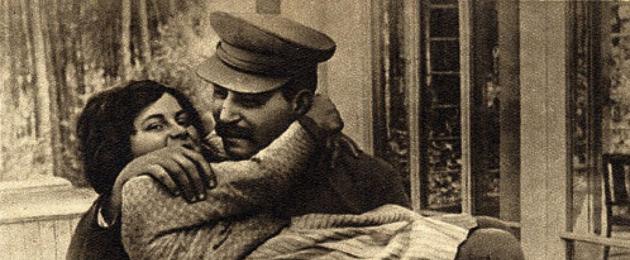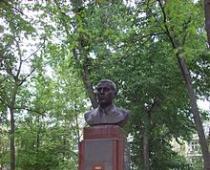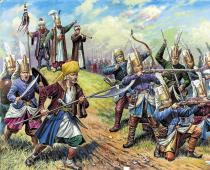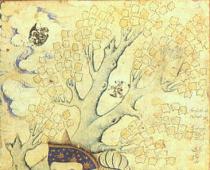Name: Svetlana Alliluyeva
Date of Birth: February 28, 1926
Age: 85 years old
Date of death: November 22, 2011
Place of Birth: Leningrad
Activity: Soviet philologist-translator, memoirist
Family status: Was divorced
Svetlana Alliluyeva: biography
Svetlana Alliluyeva is the only daughter of the “leader of all times and peoples”, whose biography looks like a complete adventure that has nothing to do with the traditional fate of the children of high-ranking Soviet political figures. Throughout her life, she moved 39 times, trying to escape from the "huge shadow" of her father, and in world history entered in 1967 after the publication of the memoirs "Twenty Letters to a Friend", in which Stalin's daughter spoke about her father and Kremlin life. In fact, the whole life story of Alliluyeva consists in her emigration to the West and return to the USSR, numerous marriages and novels, which she literally stated in her memoirs, which were very popular all over the world.
Alliluyeva Svetlana Iosifovna was born on February 28, 1926 in Leningrad in the family of the Soviet revolutionary Joseph Stalin and Nadezhda Alliluyeva. She became the second child in the family of the future "leader of the people" - she had an older brother, Vasily, and a half-brother, Yakov, who was born in Stalin's first marriage to Ekaterina Svanidze. Alliluyeva's childhood, despite the financial well-being of her family and the love of her parents, cannot be called bright and happy, since the father expressed his love in an insulting way for the child, which left an imprint on the entire future fate of the girl.

In 1932, six-year-old Svetlana became half an orphan - her mother committed suicide, so the children remained in the full care of their father, who could not give them due attention due to full employment in public service. Then the nanny Alexandra Andreevna, who had previously worked in the family of the French playwright and philosopher of Russian origin Nikolai Evreinov, took up the upbringing of the children of Stalin, Svetlana and Vasily. It was her influence that set the key direction for the future career of Svetlana Iosifonva, who from childhood wanted to become a philologist.
Alliluyeva graduated with honors from exemplary school No. 25, where she showed her pronounced interest in literature. School years Stalin's daughters walked next to their father in the Kremlin, but this did not bring joy to the child. She was taken to school by a personal driver, at home she was surrounded by numerous governesses, but she was strictly forbidden to communicate with her peers, walk with the neighbor's children and engage in conversations with strangers. Therefore, she brightened up her leisure time by studying in English and viewing Soviet films on a home movie projector.
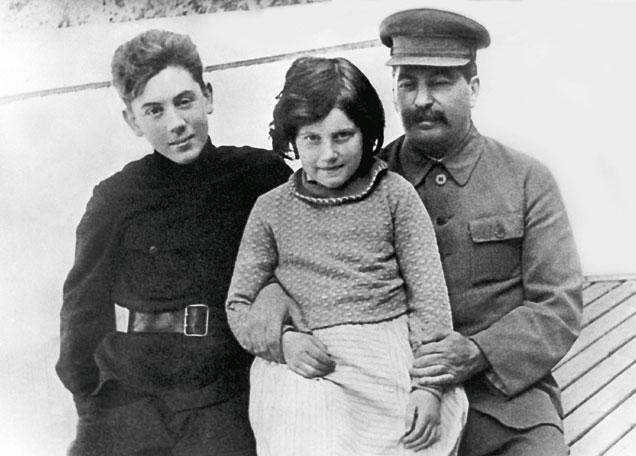
At the end of school, Svetlana Alliluyeva wanted to enter the Literary Institute, which caused the anger of her father, who considered writing an unworthy occupation for his daughter. Stalin insisted that she enter the Faculty of History at Moscow State University, but after graduation, Svetlana nevertheless received Joseph Vissarionovich's "blessing" and became a graduate student at the Academy of Social Sciences under the Central Committee of the CPSU. In 1954, Stalin's daughter defended her dissertation and became a candidate of philological sciences.
The fate of Stalin's daughter
After graduate school, Svetlana Alliluyeva actively took up literary activity, as a real “philological maiden” came out of her. She got a job at the Institute of World Literature, where she studied books by Soviet writers and translated English-language books, which included John Lewis's The Munich Plot.
In the 60s after the death of Stalin, who left Alliluyeva 900 rubles in a savings book, and during the beginning of the "Khrushchev thaw", the biography of Svetlana Alliluyeva radically changes its direction. Having already been divorced twice, she enters into a civil marriage with an Indian citizen Brajesh Singh, with whom she lived for several years. In 1966, Singh dies from a serious illness, and she decides to bury him at home. The Soviet authorities allowed Stalin's daughter to go abroad, from where she did not want to return to the USSR.

Svetlana Iosifovna asked the United States for political asylum, which caused a loud scandal in the Union. She was automatically included in the list of "traitors-defectors", for which Alliluyeva was deprived of citizenship. It was not possible for Stalin’s daughter to leave India directly for the States - she was first sent to Switzerland, and only after that she managed to move to America.
Unexpectedly for everyone in 1984, Svetlana Alliluyeva decided to return to her homeland. In the USSR, the “fugitive” was kindly welcomed and provided with all the conditions for a comfortable stay - housing, a personal car with a driver and a pension, since the KGB did not want to let her out of sight. According to Stalin's daughter, at that time she fell under the hermetic "cap" of the Soviet regime, which the woman categorically refused to put up with. Therefore, she moved to her father's homeland in Georgia, where she was also provided with truly royal conditions for life.
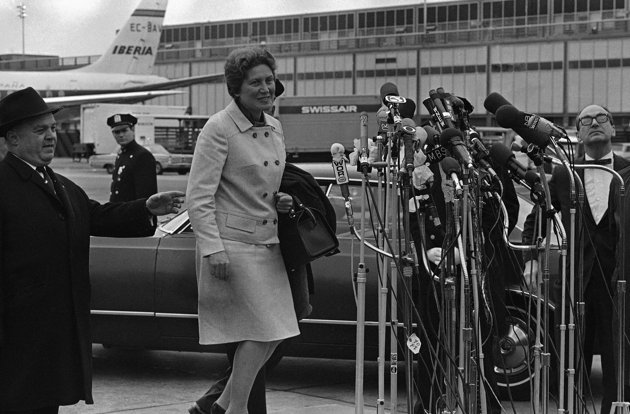
But two years in the Union did not bring Svetlana either happiness or peace, so she decided to return to America. This time, the first and only president of the USSR helped her to leave. He personally ordered that Stalin's daughter be freely released from the country, after which Svetlana Iosifovna forever renounced Soviet citizenship.
Returning to America, she was never able to arrange her life, so she had to settle in a nursing home in the city of Madison. In 2005, for the first time in many years, Svetlana Alliluyeva agreed to give an interview to Russian journalists and even star in documentary"Svetlana about Svetlana". True, at the same time, Stalin's daughter categorically refused to speak Russian, referring to the fact that she had nothing to do with the Russian people, since her father was a Georgian, and her mother was the daughter of a gypsy and a German.
Compositions
Throughout her life, Svetlana Alliluyeva was engaged in writing memoirs, in which she outlined her memories of her father and Kremlin life. Her first essay, 20 Letters to a Friend, was published in London in 1967. The book made a splash both in the West and in the USSR, which brought Stalin's daughter world fame and a fee of $ 2.5 million.
At that time, “Stalinism” was still massively condemned in the Union, so no one believed that Svetlana Iosifovna earned this money with her writing work - there was a version that she withdrew this money from Stalin’s Swiss account, who was saving money abroad for a rainy day. Later this version was completely refuted.
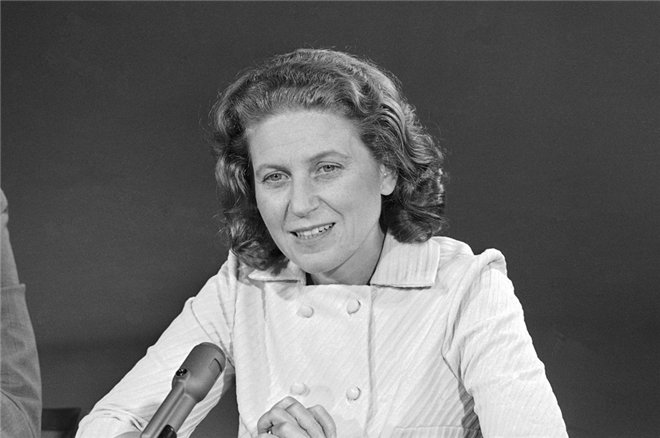
Then Svetalana Alliluyeva published three more compositions: “Only One Year”, “Distant Music” and “A Book for Granddaughters”, which she released under the pseudonym Lana Peters. These memoirs of Stalin's daughter did not bring her phenomenal success, since society had already learned important information from her first book, and in the Union by that time Stalinist repressions began to justify and find explanations for them.
Personal life
The personal life of Svetlana Alliuyeva is a continuous stormy romance, which is of interest in modern society. Stalin's daughter was married 5 times, and between marriages she started high-profile novels that caused a resonant reaction (especially in the USSR). The first time she married back in her student years for a classmate of her brother Grigory Morozov, which caused sharp discontent among her father. Then Stalin categorically refused to even see his son-in-law and did everything possible to break up the young family as quickly as possible. In this marriage, Alliluyeva had her first child, whom she named Joseph in honor of her father.
In 1949, Svetlana Iosifovna divorced her first husband and was married to Stalin's chosen one, Yuri Zhdanov, who is the son of the secretary of the CPSU Central Committee. Young people had never even met before marriage, so their marriage was not the most pleasant "surprise" for both. Alliluyeva gave birth to Zhdanov's daughter Ekaterina, but after giving birth she immediately divorced her husband. After that, Stalin had to come to terms with the rebellious nature of his daughter and stop interfering in her personal life.

In 1957, Stalin's daughter married the Soviet Africanist Ivan Svanidze for the third time, with whom she also did not find happiness. Two years later, the family broke up, and Alliluyeva began to regularly start novels, which earned herself a reputation as a fickle woman who did not adhere to the moral and ethical standards of society. Then the list of Alliluyeva's men was replenished by the poet David Samoilov and the literary critic Andrei Sinyavsky.
Alliluyeva's fourth marriage was civil, since an Indian became her chosen one. At that time, the Soviet authorities forbade her to legalize relations with a foreigner, after whose death the first emigration of Stalin's daughter from the USSR took place.
In 1970, Svetlana Alliluyeva married for the fifth time in the United States. Her husband was the architect William Peters. In this marriage, Stalin's daughter had a third child - daughter Olga, but this did not allow her to maintain relations with an American who, as it turned out, married a "Soviet princess" in the hope that she was a rich heiress of the "leader of peoples." After Svetlana Iosifovna spent her entire fee for memoirs on her husband's projects, he left her with a child in her arms, leaving her without a livelihood.
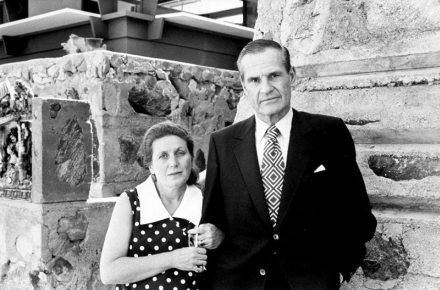
All these "vicissitudes" of fate, political persecution and constant moving from country to country completely severed Svetlana's relationship with her children, who today do not even want to hear about their mother. Her eldest son Joseph was a renowned cardiologist who died of a stroke in 2008. The Middle Daughter Ekaterina became a volcanologist - she worked all her life in Kamchatka and could not forgive her mother, who left her in the Union during her first emigration. The youngest daughter, Olga Peters, who later took a different name for herself, just like her older brothers and sisters, lost her mother in 1986, when, upon returning to the United States, she sent the girl to a Cambridge boarding school.
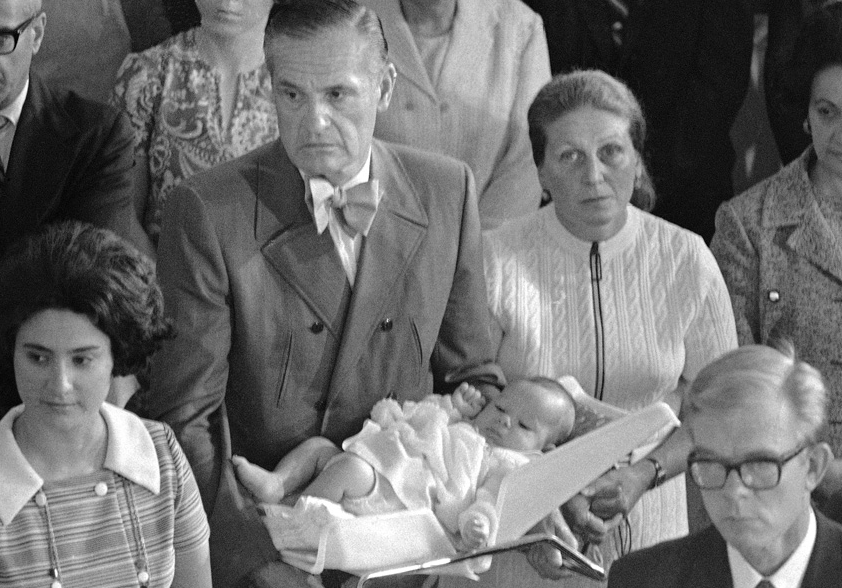
Death
In 2011, at the age of 86, Svetlana Alilluyeva died in one of the nursing homes from colon cancer. At the request of daughter Olga, her body was cremated and sent to Oregon. Before today the date and place of the funeral of Stalin's daughter are unknown.
Later it turned out that all her life in America, Svetlana Alliluyeva was under the gun of the CIA, which became known after her dossier was declassified by the FBI. It follows from the document that Svetlana Iosifovna, because of her “pedigree”, had a very harsh and harsh attitude towards herself. Her fate was filled with tragedy and loneliness, which became a kind of retribution for the Stalinist repressions, which brought grief to almost every Soviet family and killed millions of people.
Stalin's only daughter, Svetlana Alliluyeva, was born in 1926. Her mother, Nadezhda Alliluyeva, committed suicide. when my daughter was 6 years old. Largely because of this, Svetlana's relationship with her father cannot be called rosy. The daughter often quarreled with Joseph Vissarionovich, cursed him, and then took the words back.
Living in the Soviet Union, Svetlana was married twice. From each marriage she had a child - son Joseph and daughter Catherine. In 1966, Svetlana fled the USSR to the States, leaving her children behind.
In the USA, Svetlana married the architect William Peters, and in 1971 they had a daughter, Olga. A year later, the couple divorced, but my mother kept her husband's surname.
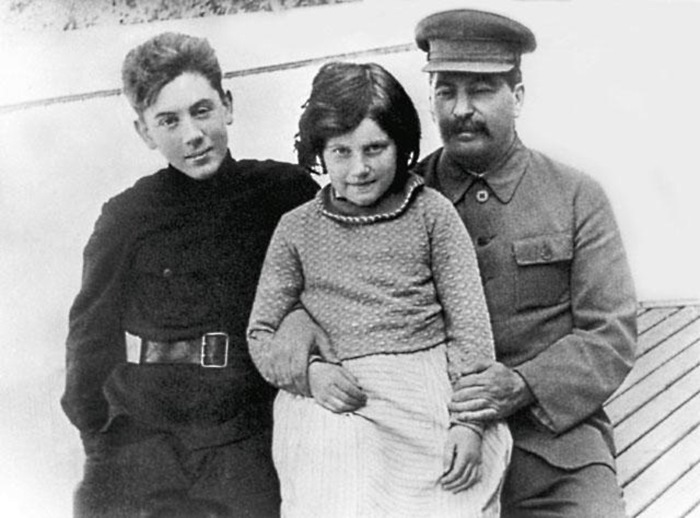
Olga was brought up as a real American. Therefore, when she asked her mother to call her Chrissy, in honor of the main character of the popular sitcom Three is a Company, Svetlana did not object. So Stalin's granddaughter became Chris Peters.

Svetlana and her daughter constantly moved from place to place. Usually this happened in November - the month when Nadezhda Alliluyeva shot herself ... Numerous moves left an imprint on Chris's life. She hates traveling and doesn't like getting close to people so she doesn't lose them later.

Together with her mother, Chris traveled not only all over America, but also lived in the UK for some time and even returned to the USSR for several years! Despite the fact that Svetlana and her daughter were received very cordially, they could not settle down here. Two years later they returned to England.
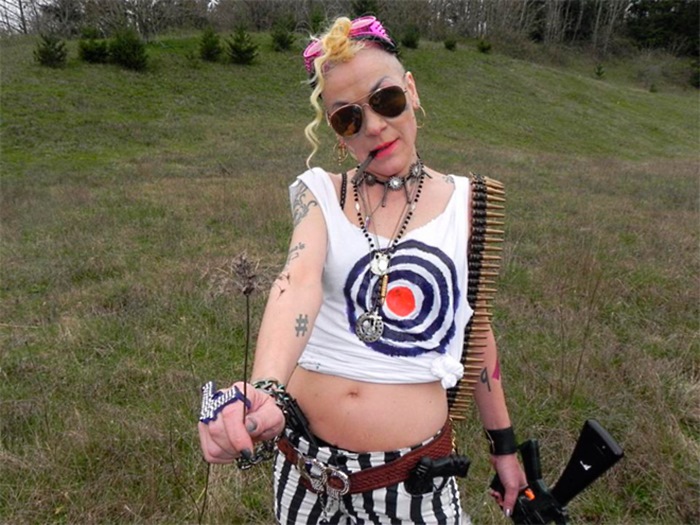
Svetlana and Chris often quarreled. It seems that only after the death of her mother did the heroine of our story realize how much she loved her. Now Chris has a tattoo on his arm with the inscription Dear Mommy (“Dear Mommy”), and for a long time her Facebook page was decorated with a photograph of Svetlana Alliluyeva.
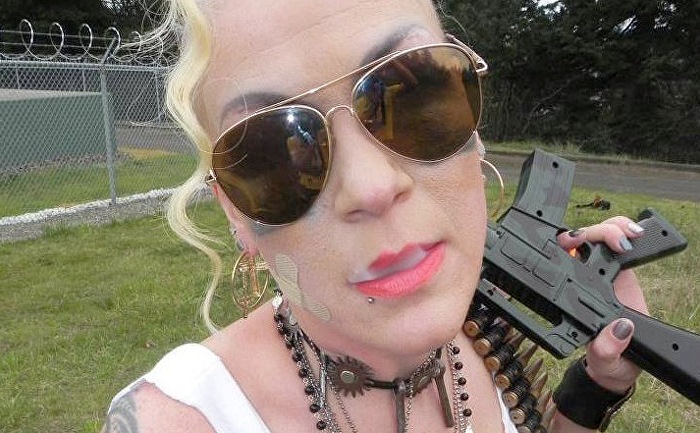
Under the picture of her mother, Chris wrote: “Putting a photo of your mother on your profile picture is a pathetic attempt to be at least a bit as great as she was. I really miss her and I really need her.”.
Every year, more and more Russians, according to studies, approve of General Secretary Joseph Stalin: monuments are erected in his honor, icons are painted and rallies are held. Snob's special correspondent Polina Eremenko tracked down a hermit scientist, a fashionable metropolitan architect, a theater director, an artist, an American driver and several rebels - and wrote down their stories. The first in a series of essays about Chris Evans, daughter of Svetlana Alliluyeva
26 October 2016 15:25
Chris Evans loves Mexican food, drugs and his dog, dislikes Russians, journalists and traveling. She has 14 piercings, a radical haircut, and a Dear Mommy tattoo on her arm. She dreams of being called out on a date to an Italian restaurant by the sea and having ecstasy flowing right from the tap in her house. It infuriates her when in the evening she does not find chocolate in the refrigerator, and in her wardrobe she really lacks a belt with a plaque in the form of ovaries. She quits smoking and starts again. She catches panic attacks in the CT scanner. She eats 20 tacos at a time, and then burps to her heart's content, saying, “Mmm, what a delicious burp.” Every month she changes her hair color - from leopard to crimson, and then to checkered. Her hairdresser Gino is her best friend. This Gino was photographed by Chris in torn tights, shorts and with a toy machine gun and a pistol in his hands. In March 2016, these photos went viral social networks and were accompanied by condemning comments: “What would grandfather say?!” Chris Evans doesn't care what grandpa would say. For her, he is just a tyrant from distant Russia, from where she once fled in search of a better life beloved mother, Svetlana Alliluyeva. Grandpa Chris - Joseph Stalin.
Vetlana Alliluyeva, the only daughter of Joseph Stalin, his "sparrows", was born in 1926. Svetlana emigrated from the USSR twice, changed her last name three times, got married four times and wrote four books of memoirs. Countless times the "sparrow" cursed her father, took the words back and cursed again.
First escape from Soviet Union Svetlana committed in 1966, when she achieved from Soviet authorities permission to accompany the ashes of her third husband, Brajesh Singh, an Indian emigrant who worked as a translator in the USSR, to their homeland. On the eve of her return to Moscow, Svetlana applied to the US Embassy in Delhi with a request to grant her a residence permit. Svetlana's two older children, Ekaterina and Joseph, waited for their mother at the airport in Moscow for several hours before they were told she would not be coming.
Chris Evans was born Olga Peters on May 21, 1971. For five years in the USA, Alliluyeva managed to write the autobiographical novels Twenty Letters to a Friend and Only One Year, for which she received $ 2.5 million in royalties. On the wave of popularity, Alliluyeva met the architect Wes Peters and married him three weeks later. Wes Peters, judging by his obituary published in The New York Times in 1991, was remembered in this world for the most part by his marriage to Alliluyeva and the fact that he led the construction of the Guggenheim Museum in New York.
The first move happened when Olga was not yet a year old: Alliluyeva packed Olga in a picnic basket, put her in the front seat of the car and hit the road. Before coming of age, Olga had to move with her mother more than a dozen times, and she hated moving forever. From Arizona to Wisconsin, from Wisconsin to New Jersey, from New Jersey to California, from one California city to another, then back to New Jersey.
Svetlana Alliluyeva always had formal reasons for moving: a better house would be in a new place, better school, better people. But everything was not so simple. “There were moments when my mother had nightmares, like a child. And it was never clear what preceded this, ”Kris said about her mother. Most often, the crossings took place in November, the month in which Svetlana's mother, Nadezhda Alliluyeva, Stalin's second wife, shot herself. According to the memoirs of Svetlana, on the evening of November 9, 1932, the parents quarreled a little. “Like “there was no reason.” Just a small quarrel at a festive banquet in honor of the fifteenth anniversary of October. “Only” her father said to her: “Hey, you, drink!” And she “only” cried out suddenly: “I don’t tell you - HEY!” - and got up, and with everyone left the table.

Photo from personal page facebook.com
Olga was worried that due to frequent moves she was losing friends. She wanted the house to be full of guests and noisy. But Svetlana Alliluyeva did not like it when there were people in the house. She wanted the house to be empty and quiet, since her own friends could not be in it. “All the years spent in America, I yearned for the company of my friends - excellent artists and intellectuals whom I knew in Moscow and Leningrad ... How I wanted here, in America, to be among similar people, highly educated - but I there was no access to them, ”Alliluyeva wrote in Distant Music.
Alliluyeva decided that after such a significant event, she could move again. She told Chris: it's time to get ready, this time we are going to the USSR. Alliluyeva wanted to see her son Joseph, the same one who stood at the airport 17 years ago and waited for her to return from India. That night, neighbors heard a loud scream from their apartment: Chris didn't want to leave the UK. Alliluyeva and her daughter left in such a hurry that they did not even throw food out of the refrigerator.
In the fall of 1984, Alliluyeva and Chris flew to Moscow. They were greeted solemnly, Alliluyeva was given back her Soviet passport, and she joyfully told the American correspondent of the ABC television channel in Moscow: “You are all savages, uncivilized people, goodbye to you all!” But the son of Joseph, whom Alliluyeva so dreamed of seeing, seemed to her too cold. "I always hold in my left hand right hand son, and I find that the hand has changed. She was thin, with long fingers, so graceful. Now the fingers have become short and thick - is this possible? A completely different hand. I look at him, he looks at me, we don’t talk, ”she wrote in her next memoirs,“ A Book for Granddaughters ”. Olga told reporters about that meeting that no one wanted to communicate with her: “They seemed to be very disappointed that we did not bring VCR and foreign perfumes with us as a gift.”
Svetlana quickly began to doubt the correctness of moving to Moscow. Another November was approaching, she stopped sleeping, not understanding what to do next. And then, on a sleepless night, she had a vision: she urgently needs to go to Georgia. Chris spent two years there, about which nothing is known, and in April 1986 information Agency The Associated Press released a report: "Olga Peters (official name Chris) is returning to her English school: Joseph Stalin's 14-year-old American granddaughter returned to her school on Wednesday, hugging teachers and classmates in tears. She stated that her mother regretted forcing her to move to the Soviet Union." Two years later, Chris married her friend by the name of Evans, became Chris Evans and disappeared from the radar for a quarter of a century.
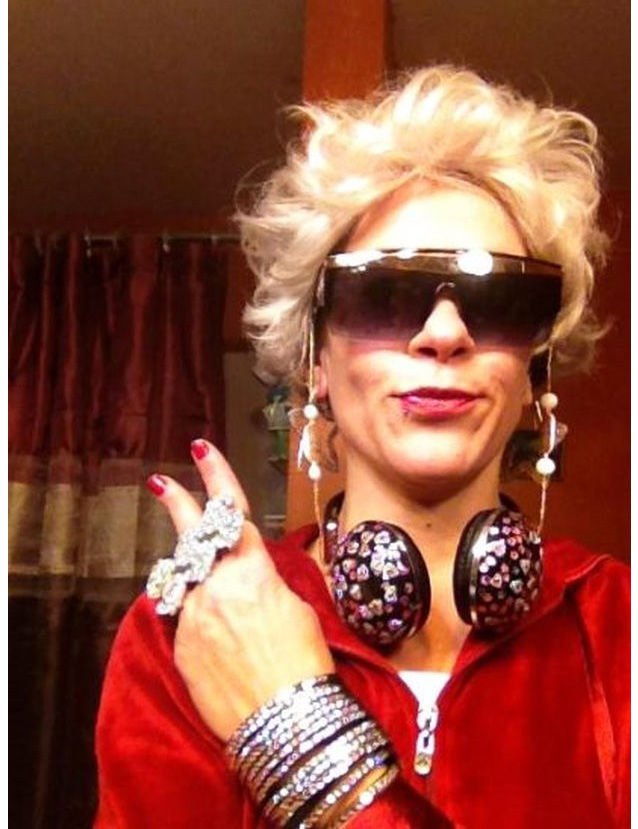
Photo from personal page facebook.com
Today, Chris Evans is 45 years old and lives in Portland, where she rents a house with friends. Chris works at Three Monkeys, a vintage and second hand store. Chris Evans does not arouse such interest as her mother from the outside world: since the 80s, one newspaper feature and two news reports have been written about her, after Alliluyeva's death in 2011, she gave two interviews. Chris Evans categorically refused to communicate with the “Snob”: “I don’t give interviews. I don’t need to call anymore, ”and deleted her Facebook page.
“The past cannot be changed. I have always understood that my number one task in this world is to take care of my mother and love her, no matter what, so that at least in her old age she can heal the wounds received in childhood, ”Kris said in one of two interviews that she gave after the death of her mother. In the same interview, she said that until the death of her mother, she talked to her on the phone every day at six in the evening, and each of them always had a glass of wine in her hand. Svetlana Alliluyeva died on a November day in 2011. Before her death, she instructed nursing home staff: under no circumstances should her daughter see her in a coffin. Alliluyeva was haunted all her life by the image of her own mother who shot herself in a coffin.
Of the relatives, Chris had only a hairdresser friend Gino and a beloved dog Sparta. Evans constantly posted her photos on her Facebook: Sparta on a walk, Sparta climbed into the bed with her mistress ... When Sparta is sick, Chris writes alarmist posts that "he will never let his dog die." And then, with irony, he remarks: “Yes, my dog has better medical insurance than mine.” Chris' insurance is really bad. She did not cover all the costs of her own treatment when she was diagnosed with breast cancer last year. Evans tried to raise money on the giveforward.com platform, but out of the $5,000 requested, she raised only $2,084. Due to bad insurance, Chris was forced to sit in a queue, waiting for each appointment for hours, and pretty soon she was suspended from work. At some point, Chris did not even have enough money for dog food for Sparta. True, everything ended well: Chris underwent a 12-week course of chemotherapy and is now on the mend. And Gino cheers her up by changing her hair every month. The only thing Chris can't handle is a leaking toilet at home that she can't fix: “Life is so funny. I can beat cancer and heal a broken heart and survive the death of loved ones, but now, when my toilet has been leaking for many days and there is no end in sight, and it costs me a dollar a second, I, *****, I'm losing my head."
It seems that five years after Alliluyeva's death, Chris Evans' life revolves around her mother. Dear Mommy is stuffed on her arm, she puts a photo of her mother on her Facebook avatar and signs: “Putting a photo of mom on your profile picture is a pathetic attempt to be at least a bit as great as she was. I really miss her and I really need her."
At night, Chris, like her mother, sometimes gets scared. The only good thing she finds about being alone is that she doesn't have to share the TV remote with anyone. She dreams of finding a new husband, such that he does not have children from previous marriages and does not spare money for a beautiful wedding. She laughs at girls choosing 1920s-inspired wedding dresses and searches for ideas for the perfect date on Bored Panda — her favorite so far is the Italian restaurant in the cave. True, as soon as she actually encounters a man, she does not understand at all what to do: “This morning I was called on a date. IN THE GYM. Yep, right during practice. Like this - how are you? And I'm all sweaty, without makeup. I don't know what to think. Any thoughts?
When Chris becomes sad, she dreams of her mother being nearby: “I want my mother to kick me in the ass, I will scream that she is crazy and fly up to the ceiling, and then everything will calm down and be as it should.” She also likes to remember how her mother cut her hair as a child: “It would be better if she wrote novels, and did not cut my hair.” The most delicious smell in the world for her is the smell of pancakes that her mother baked as a child, and she makes borscht only according to her mother's recipe, adding an egg to it. And my mother's borscht is, it seems, the only thing from Russian that she likes. The rest of the time, “Russian” is more of a dirty word for her. If an asshole steps on his foot in a supermarket, he’s definitely Russian.
7 0
“Kalina-raspberry, my daughter ran away Stalin, Svetlana Alliluyeva, what a family of figs! ”, - so responded folk art to an event that put the Politburo of the Central Committee of the CPSU and other governing bodies of the Soviet Union on the ears.
The beloved daughter of Joseph Stalin, whom the foreign media referred to as the “Red Princess”, became a “defector”.
Svetlana Iosifovna gave a lot of trouble even to dad. The stormy temperament of her daughter resulted in a series of novels that Svetlana began at a minor age. From the choice of his daughter, Stalin often became furious, which fell on the heads of unlucky boyfriends. For the director Alexey Kapler relationship with the girl turned into a long stay in the Gulag.
In 1944 Svetlana married Grigory Morozov, her brother's classmate, Vasily Stalin. A son was born in the marriage, who was named Joseph, but the relationship did not last long. In 1949, Stalin's daughter married a second time - this time for the son of an ally of the leader Yuri Zhdanov. The marriage lasted three years and in it Svetlana had a second child - a daughter Ekaterina.
Farewell ceremony for Joseph Stalin. Svetlana Alliluyeva is in the center. Photo: RIA Novosti
under the wing of the state
After the death of her father, Svetlana found herself under the scrutiny of the new leaders of the state. True, unlike her brother Vasily, she was not put away either in prison or in a psychiatric hospital. She worked at the Institute of World Literature, in the sector for the study of Soviet literature.
Svetlana, now bearing the name Alliluyeva, continued to try to arrange her personal life. The Indian aristocrat and communist became the next chosen one of the lady Raja Bradesh Singh.
The Soviet authorities were rather wary of marriages with foreigners. But, firstly, Alliluyeva did not officially marry Singh, secondly, India was considered a friendly state, and thirdly, the leaders of the countries believed that it would be better for Stalin's daughter to deal with men than publicly say something superfluous.
According to the memoirs of the then head of the KGB of the USSR Vladimir Semichastny, Alliluyeva lived very well by those standards - a good salary, payments to herself and her children. Stalin's daughter lived in a "house on the embankment", a summer house and a car were assigned to her. In general, Svetlana Iosifovna could support not only herself and her children, but also her common-law husband, who transferred all his earnings to relatives in India.
Guarantee of Comrade Kosygin
In the autumn of 1966, Raja Bradesh Singh died after a serious illness, and Svetlana Alliluyeva wrote a letter Leonid Brezhnev with a request to allow her to travel to "her husband's homeland to scatter his ashes over the sacred waters of the Ganges."
The Politburo thought about how to act. The Soviet leaders knew that Alliluyeva had finished work on the book Twenty Letters to a Friend. The content of this manuscript was well known to them. In general, they didn’t see anything too seditious in her - Svetlana criticized her father for the repressions, which was not at odds with the official course of the party. But, at the same time, they were not going to allow the publication of memoirs in the USSR, and they were not eager for the book to be published in the West.
They decided that Alliluyeva could be released, instructing the KGB to prevent the export of the manuscript by Stalin's daughter.
Mikhail Semichastny claimed that Svetlana did not take her out, but nevertheless managed to somehow transfer her abroad.
The decisive factor in allowing Alliluyeva to leave was the personal guarantee of the head of the Soviet government Alexey Kosygin who had friendly relations with Stalin's daughter.
Confidence was added by the fact that Svetlana's son Joseph was going to get married and the date of the celebration was set. Members of the Politburo logically reasoned that it was unlikely that the mother would miss her son's wedding.
KGB warns
Ambassador of the USSR in India Ivan Benediktov was instructed to provide all possible assistance to Svetlana.
In December 1966, Svetlana Alliluyeva arrived in India, where Ambassador Benediktov placed her in a separate apartment on the territory of the village of Soviet diplomatic mission employees.
The ashes over the waters of the Ganges were scattered, but Svetlana Iosifovna was not in too much of a hurry to return to her homeland. With permission to stay for seven days, Alliluyeva spent a month in India. The son called his mother from Moscow, asking when Svetlana would return. She begged Joseph to postpone the wedding.
Alliluyeva herself persuaded Ambassador Benediktov to resolve the issue of extending his stay in India for another month. The diplomat agreed, and Svetlana was indeed given the go-ahead. At the same time, Stalin's daughter left for her late husband's native village and disappeared from the field of view of her compatriots for a month.
Finally, in early March, it was decided that Alliluyev should be returned. Moreover, Joseph was losing patience, and his calls to his mother, who returned to Delhi, were extremely nervous.And Svetlana Iosifovna asked the ambassador to once again extend her stay in India. But this time, Ivan Benediktov handed Alliluyeva a passport and a plane ticket to Moscow on March 8.
Stalin's daughter began to collect things and buy gifts, but the head of the Soviet intelligence station in Delhi was wary - there were certain oddities in her behavior. In a restaurant, a scout under the guise of a foreigner managed to talk to Svetlana, who leaned heavily on alcohol. She, slandering the Soviet leadership, including Kosygin, who vouched for her, let it slip that she wanted to stay abroad, and already had “some agreements” for this.
The conversation was reported to Ambassador Benediktov, but he did not believe it. Just in case, Svetlana was assigned to observe a special services officer who worked at the embassy. Alliluyeva had to be watched especially carefully during her traditional evening walks. The fact is that Svetlana Iosifovna was walking past the territory of the US Embassy.
Gate to the "free world"
Despite these precautions, Svetlana Alliluyeva fled. Right before the eyes of her escort, on the evening of March 6, 1967, she “dived” into the territory of the US Embassy through the gate, which was usually closed.
On the same night, the Americans took the woman to the airport and she flew to Switzerland, where she asked for political asylum. However, she was refused first in Switzerland and then in Italy, and in transit through Germany arrived in the United States, where she was granted asylum.
“Hello everyone! Very happy to be here! It’s just wonderful!” Stalin’s daughter greeted journalists at Kennedy Airport.
And in the USSR at that time there was a "debriefing". Kosygin was a "high-flying bird", so they preferred to forget about his guarantee. The main "scapegoat" was Ambassador Benediktov, who was recalled from India, transferred to work in Yugoslavia, relations with which at that time were very difficult.
The escape of Alliluyeva became one of the arguments for the removal in May 1967 of the head of the KGB, Vladimir Semichastny. In addition, more than a dozen Soviet officials of a lower rank were punished.
Already from abroad, Svetlana called her son, trying to explain the motives for her act. Joseph refused to understand his mother, considering her act a betrayal. He also did not allow Svetlana to talk to her sister.
New York - Moscow - New York
On her memoirs, Alliluyeva managed to make a decent capital, and in 1970 she married an American architect William Peters. She took the name Lana Peters gave birth to a daughter, who was named Olga, and the birth of Stalin's granddaughter in the United States became a new sensation for the American press.
But gradually interest in it in the United States began to fade. The expected hunt for a fugitive by the KGB did not follow - the new head of the Committee Yuri Andropov decided that Alliluyeva was of no interest.
Lana's new marriage lasted only a couple of years, as the architect Peters began to lament that "Lana woke up with dictatorial traits, the same as her father."
Having lived for a decade with her daughter in the USA, in 1982 Svetlana moved to the UK, and in November 1984 she appeared ... in the Soviet Union.
This was not an operation of the special services - Stalin's daughter was homesick for her homeland. At a press conference, she scolded the West and accused the American intelligence services: “All these years I have been a real toy in the hands of the CIA!”
She was settled in Tbilisi, they created all the conditions for her, but two years later, already under Mikhail Gorbachev, she again asked for permission to travel to the United States. She received it quickly enough - everyone was already tired of the "turns" of Svetlana Iosifovna. The children, abandoned by her in the USSR, could not forgive her.
Olga Pieters changed her name to Chris Evans and currently lives in Portland. Whether she, unlike her brother and sister, was close to her mother is known only to herself. For the last two decades of her life, Svetlana Alliluyeva lived almost as a hermit, now in the USA, now in the UK, rarely giving interviews. She died in November 2011 at a nursing home in the American city of Richland, Wisconsin.
- In contact with 0
- Google Plus 0
- OK 0
- Facebook 0

